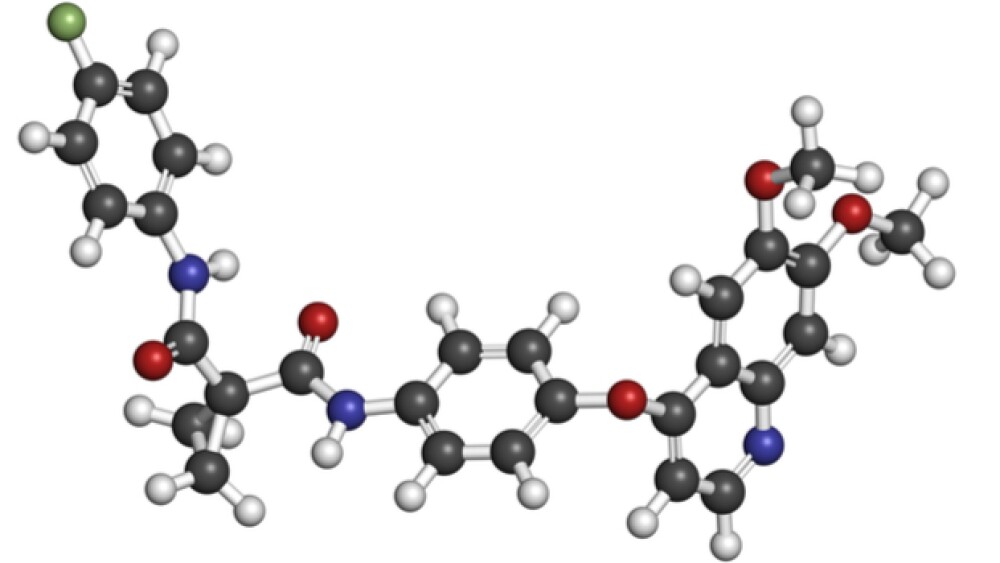The FDA approved Cabometyx based on the Phase III CELESTIAL trial that showed the drug provided a statistically significant and clinically meaningful improvement in median overall survival.
Cabozantinib drug molecule, just approved for the treatment of hepatocellular carcinoma (HCC).
Shares of Alameda, Calif.-based Exelixis are climbing after the U.S. Food and Drug Administration (FDA) approved its hepatocellular carcinoma (HCC) treatment Cabometyx (cabozantinib). It was previously approved for the treatment of patients with advanced renal cell carcinoma.
The approval came despite a partial government shutdown that will likely delay a number of potential approvals unless funding is restored to the regulatory agency. Exelixis’ Cabometyx was approved for HCC patients who have been previously treated with the chemotherapy drug sorafenib.
The FDA approved Cabometyx based on the Phase III CELESTIAL trial. Cabometyx targets MET, AXL and VEGFR-1, -2 and -3. Phase III data showed Cabometyx provided a statistically significant and clinically meaningful improvement in median overall survival compared to placebo in patients with advanced HCC. Median overall survival was 10.2 months with Cabometyx versus 8 months with placebo. Median progression-free survival was more than doubled, at 5.2 months with Cabometyx and 1.9 months with placebo. Following an interim analysis in 2017, the Phase III CELESTIAL trial was halted early due to achieving efficacy.
Hepatocellular carcinoma is the most common form of liver cancer, which is the third-leading cause of death worldwide. About 700,000 people die from liver cancer each year, according to Exelixis. HCC is the fastest-rising cause of cancer-related deaths in the United States, the company added. Without treatment, patients with advanced HCC usually survive less than six months.
Ghassan K. Abou-Alfa, a physician with Memorial Sloan Kettering and the lead investigator of the CELESTIAL Phase III trial, said patients with advanced HCC have few treatment options, particularly if their disease has passed treatment with the chemotherapy drug sorafenib. The CELESTIAL trial showed that Cabometyx has the “efficacy and safety profile to become an important new therapy in our efforts to slow disease progression and improve treatment outcomes,” Abou-Alfa said.
In November 2018, Cabometyx was approved in Europe as a monotherapy for HCC in adults who have previously been treated with sorafenib.
Exelixis Chief Executive Officer Michael M. Morrissey said the new approval for Cabometyx is an important treatment advance for HCC patients. Morrissey added that the company continues to explore how Cabometyx can be a benefit for people with difficult-to-treat-cancers beyond renal cell carcinoma. In December 2018, Exelixis and its developmental partner Ipsen launched COSMIC-312, a Phase III pivotal trial of cabozantinib in combination with atezolizumab versus sorafenib in previously untreated advanced HCC. The trial will also explore single-agent activity of cabozantinib in the first-line setting.
Shares of Exelixis are up nearly 5 percent to $23.96 as of 11:01 a.m.





